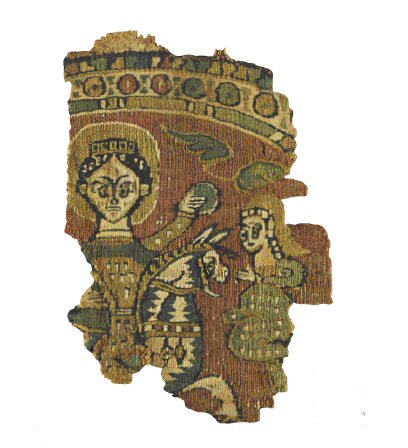Way of the Warrior Saints/Saint Haral
 Fragment of a tapestry depicting Saint Haral on his steed. Notice the peasant supplicating before his glory!
Fragment of a tapestry depicting Saint Haral on his steed. Notice the peasant supplicating before his glory!
Sometimes known as "The Saint of the Plains" or "The Righteous Rider".
Haral was a horseman who lived on the Estonian plains in ages past. He was most likely the chieftain of a nomadic peoples, one that fought on horseback, before the rise of the Mighty Kingdoms.
Haral led his cavalry into battle to repeatedly repel marauding Vikings each time they ventured from the East, riding as far as Saradic, Dondor, or Amdor. Some Haral commanded a hundred cavalry and when they all rode at full gallop, the ground thundered in a deafening roar. Haral kept a mighty hall in Melias, despite the nomadic ways of his people, and after every victory, he and his men would ride hard, back to the hall for feasting and fellowship.
It is said that one winter, the vikings banded together to defeat Haral and his horselords. They came as a full army, prepared to slay all the men of the Plains, and verily, they succeeded in fought ferociously, until only Haral and his steed were left. Haral, covered in the blood of his beloved horses and soldiers, sank to the Holy Earth, and made a promise to ever protect those lands. The Earth and Stones heard his Oath, and granted him Divinity. Haral arose, his wounds healed, and his steed now unfolded golden wings. Rising into the sky, Haral (with spear in one hand and axe in the other) and his Winged Steed slew all the vikings, and their bodies blew away as little more than fine ash in the breeze. Haral's fallen soldiers and their horses were swallowed into the earth of the flatlands, given holy burial by the Firstborn Soil itself. Thereafter, the people knew he was a Righteous Saint.
Some say he will show himself again, to defend the plains from plundering Vikings, or other evils, should the dire need arise.
Notable Scriptures
"The Spear shall be golden, and the Sun sharp." (The Drumming Hooves of Glory, Third Oration, verse 41)
"From the mountain shall my spearshaft come, from the sky my stallion swift, and from the lake my armor and helm." (The Drumming Hooves of Glory, Fourth Oration, verse 10)
"Look out upon it, sword-friends; gaze thou deeply into the west, and harken to the howling sand. Today thy mind is fresh and bays the fiends, and for tomorrow also, and even unto the age: but be thou not too proud, for the time is coming when the unfriendly desert shall remind unto thou the furies of a the Saintless." (The Endless Horizon, Prologue)
"Is a city the property of its people? Do farmers own the seasons? Is the swiftness of a horse in the legs of its rider? Can a city without a king be prosperous? These are all the same question." (The Endless Horizon, Saying 24)